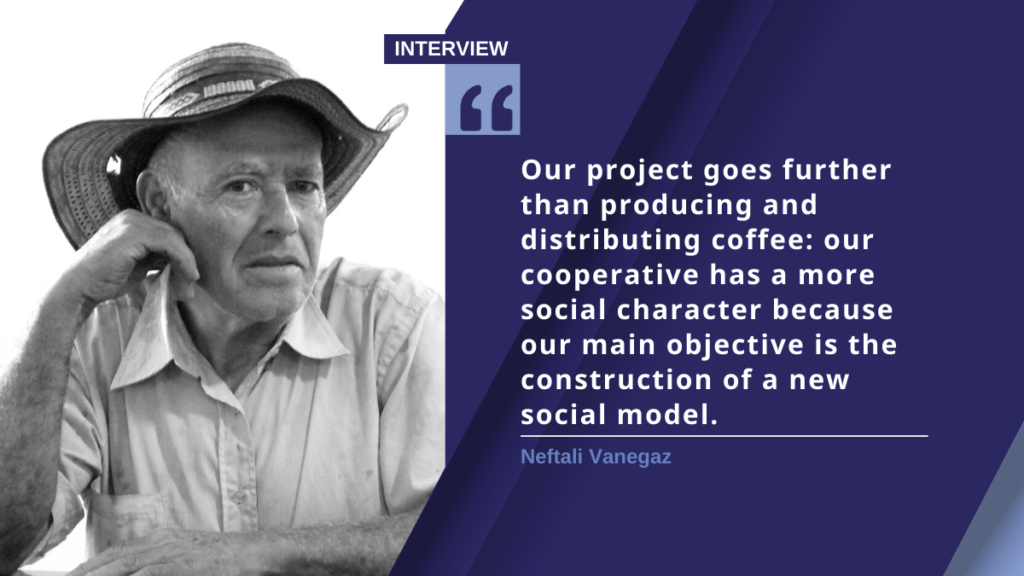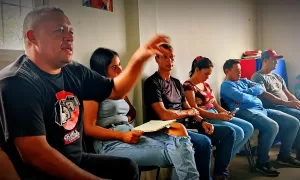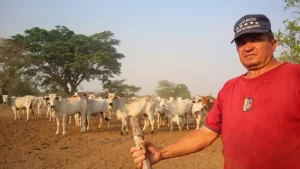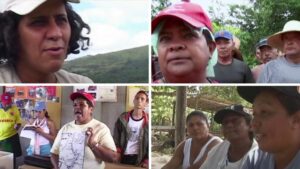[Part I of this article was published in the previous issue of Janata blog.]
[The Che Guevara Commune lies on the fertile hillsides that rise up from the shores of Lake Maracaibo in western Venezuela. Historically this has been a cocoa-growing region but in more recent years coffee, sugar cane, and pineapple have also become important cash crops. It is a region of much domestic and international migration, and many of the communards have roots in neighboring Colombia, belonging to families that fled political persecution or simply sought a better life in Venezuela.
Through hard work, focused on key two productive activities – a lowland cocoa-processing plant (the Che Guevara EPS) and a highland coffee cooperative called Colinas del Mirador (Colimir) – these communards have built a sociopolitical project that has survived all kinds of adversity.
A short flight to Merida’s El Vigia airport and a two-hour drive along the Panamerican Highway brought us to this well-kept commune centered in the village of Mesa Julia (Tucaní township). Our main interest was to see how this commune, with a far-reaching reputation worthy of the revolutionary name it bears, has dealt with the US sanctions and the overall crisis that Venezuela is facing. However, we also wanted to know about their approach to communal construction in general and the longstanding project of a socialist transition in the besieged country.
In Part I of this three-part series, we looked at the Che Guevara Commune’s creative responses to the challenges thrown up by the sanctions, which include the application of a new fuel-saving technology and developing their own currency.
In Part II, we learn about the democratic organization of labor in the Che Guevara Commune’s two main productive units.]
Che Guevara EPS
[The Che Guevara EPS is a collectively-owned and democratically-managed cocoa processing center in the foothills of Mesa Julia. Launched in 2014, the EPS (Social Property Enterprise) comprises a large-scale greenhouse, a cocoa fermentation and drying structure, and a plant for chocolate production.]
Ernesto Cruz: (Ernesto is a key spokesperson of the Che Guevara EPS. He has wide-ranging intellectual interests, including a formidable command of both Spinoza’s philosophy and the details of chocolate production.) We registered the EPS at a time when there were very few socially-owned communal enterprises in the country. To set up the structure of the EPS, we followed Chávez’s Communal Economy Law, which calls for democratic control of the production and of administrative processes. Some colleagues from the Ministry of Science and Technology helped us make those first steps.
Broadly speaking, our objectives were (and continue to be) to promote the growing and processing of cocoa at the local level by providing an industrial infrastructure while taking a step toward democratizing the production processes.
The project design phase lasted almost a year. During that time we participated in workshops, learned about chocolate production processes, collected cocoa and chocolate samples, and built a network with producers in the area.
In 2016, we built a large greenhouse with the capacity to nurture 80 thousand seedlings, and we began greenhouse operations in early 2017. Financing for the processing plant was approved that same year, but the funds didn’t come to us directly. Instead, they went to the Tucaní Mayor’s Office.
Between slow administrative processes and bureaucratism, the town hall withheld resources for almost a year. When we finally managed to get the funds, the money was only enough to buy the plot of land [due to inflation] where we eventually built the processing plant.
We began to do artisanal cocoa processing onsite, while we continued to seek funds to build a mechanized chocolate plant. Our collective dream of having a communally-owned chocolate plant in this cocoa-producing region was finally becoming a reality!
We began to produce chocolate, learning the entire process, from drying to roasting, from grinding the seed to molding. Since we didn’t have molds, we used cut-up oil bottles and other containers to do the tests… And when we finally were satisfied with the product, we started to market it [in 2019].
Those years were difficult: the impact of the sanctions was widely felt and the political situation was unstable because of coup attempts and even a self-proclaimed president. Nonetheless, we managed to implement the process of producing quality chocolate, so we were very happy!
Zulai Montilla (She works in administration in Che Guevara EPS. She is a true believer in workplace democracy and horizontal control structures): The Che Guevara EPS has fifteen workers. We are organized in four areas: administration, comptrollership, production management, and education.
However, more important than the structure of the organization, is that there is no president, no manager, no boss. Decisions are made collectively with equal participation from all workers. All important decisions – from allocating resources to solving problems or accepting (or not) a large order – go through the assembly. We decide all important matters together.
In other words, the EPS is an assambleary organization. Sometimes people come here and ask: “Who is the boss?” We tell them that there is no boss, that everyone’s voice counts equally… but it is hard for people to understand this new form of organization.
Little by little, we have overcome old vices and built a democratic culture.
Of course, this doesn’t mean that all small decisions that are made on a daily basis go through the assembly. In fact, that is what the four administrative areas that I mentioned before are for: everyone knows their responsibilities.
Pastora Ruiz de Marcaneo (He works at the Che Guevara EPS, and takes care of the cocoa seedlings): Building something from the bottom up is a difficult but beautiful experience. I have been at the Che Guevara EPS since the beginning, and I contributed, with my own hands, to building it. We have made sacrifices, but it’s been worth it because we now have means of production here to serve the community and not to enrich the bosses.
Additionally, whoever works with chocolate falls in love with it. We do everything here. from selecting the seeds to caring for the seedlings, to fermenting and drying cocoa, to processing the seeds, to the final preparation.
Carlos Eduardo Urbina (He is an agroengineer and part of the Che Guevara EPS): This cocoa-processing plant was built by the EPS’ workers, through hard work, a great deal of commitment, and many sacrifices. Along with that, there was financial support from the Ministry of Science and Technology.
The greenhouse was the EPS’ first big step. We made it to improve cocoa production in the area, both in quality and volume. That required choosing plants that are well adapted to local conditions, carefully selecting the best seeds, and taking much care with the seedlings as they sprouted and grew. All this process is carried out rigorously, so as to improve the plants, but we don’t experiment with genetic modifications.
In addition to cocoa seedlings, we also produce cocoa shade trees here. The cocoa plant, like the coffee plant, requires shade.
Over the years we have learned a lot, but we know that both the workers and the area’s cocoa producers still have much to learn, from seed selection and the care of seedlings, to care of the crop and cacao processing.
Pastora Ruiz de Macaneo: Based on a survey of the cocoa plantations in the area, we determined that the cocoa trees here were very old or had not received good care, so they had to be replaced to increase production. That is why we decided to build this massive greenhouse.
The greenhouse has space for 40 to 50 thousand seedlings. In the first year, many wanted cocoa seedlings because the price of cocoa was very high, and people were keen to renew their plantations. In 2018, we produced about 40 thousand plants. We have gone on producing about 20 thousand seedlings a year since then.
In addition to cocoa seedlings, we are now growing other vegetables and medicinal plants. This began with the pandemic: it became very difficult to acquire food due to the lockdown.
Ernesto Cruz: At the EPS we produce bonbons, cocoa powder, and a range of chocolate bars. We have an installed capacity for a 1,300 kilos per week output, but we are not producing so much now: the crisis and the sanctions have affected us a great deal!
Concerning distribution: most of our production goes to chocolatiers in Mérida. However, before the crisis got worse and transport became difficult, we also had orders coming in from other states.
Nowadays the orders we receive are relatively small, between 30 and 80 kilos. During the school year, we also distribute chocolate to educational institutions in the area. Furthermore, we have done several barter exchanges with El Maizal Commune. In the most recent one, we traded 400 kilograms of chocolate for cornflour and other products. That exchange was very rewarding.
In the future, we hope to export internationally as well. Our chocolate is of high quality and it could be used abroad. In the meantime, we have to increase our production and get all the necessary sanitary and export permits. For now, we have permits for local commercialization, which weren’t easy due to bureaucratic barriers.
Colinas del Mirador Cooperative (Colimir)
(Colinas del Mirador, known shortly as Colimir, is a coffee producers’ cooperative in the upper part of Mesa Julia. Its main physical assets are a mechanized coffee processing plant and a greenhouse nursery to improve coffee quality and yield in the area. Colimir also works to provide better living conditions to the Rio Bonito Alto community, where the co-op has its headquarters.)
Neftali Vanegaz (He is a Colombian born coffee grower, a long-standing campesino organiser, and Colimir founder): I arrived in Venezuela in 2003 from Colombia, where I had been the victim of an assassination attempt. We had very good work going on there with coffee cooperatives, but paramilitarism and the Colombian state’s war against the people forced us to leave.
We weren’t the only ones forced to flee. Thousands of us migrated to Venezuela at that time. In my case, I had to walk for six days with my partner and my young son to emigrate. We first settled in Machique, in La Guajira [Zulia state]. The situation there was very difficult, so two years later we came to Tucaní where we had some friends. We immediately fell in love with this area, because it’s very similar to where I grew up, which is also a coffee-growing highland.
My partner and I bought a small plot of land and we started to work, but we also wanted to promote organization: that practice ran in our blood. There was a cooperative here, but it was not very active, so we began to reactivate it.
The process wasn’t easy because there was a clientelistic outlook: many conceived the cooperative as a means to obtain state resources. Instead, our objective was to generate better conditions for production and to generate bonds of solidarity within the community.
Little by little, we overcame some initial contradictions, and by 2010 the cooperative began to bloom. At that time the Science and Technology Ministry gave us support to plant 10 thousand coffee trees. With the resources that were transfered to the co-op, we managed to plant 30 thousand trees. That was an important step for us!
In 2014, we received financing to build a greenhouse nursery to improve coffee production in the area. We also began to design a coffee processing plant.
That process wasn’t easy because the Science and Technology Ministry wanted to manage the project directly, but we thought that self-managed construction would be more efficient. In the end that is what happened: with the resources approved to build the plant and offices, we managed to build an auditorium and two dormitories as well.
Felipe Vanegaz Quintero (He is spokesperson for the Colimir cooperative. He is a leader of the Communard union, a Che Guevara commune parliamentarian, and is deeply committed to industrialising Venezuelan agriculture): The cooperative precedes the communal council and the commune, and it has its base in something preexisting: production. It was born with the aim of improving production and industrializing coffee processing in the area. That is what we do best here in the higher lands of Tucaní.
Colimir has had its ups and downs. Around 2006 the Venezuelan Coffee Corporation [state enterprise] arrived with its big economic muscle and began to directly buy people’s production. At around the same time, people were also giving up on coffee growing, because the regulated price was way too low. In Chávez’s plan the low, regulated prices were to be offset by direct subsidies from the Venezuelan Coffee Corporation, but those funds never reached the campesinos. The whole situation led many to substitute coffee for pineapple, plantain, or cocoa.
Another factor in Colimir’s decline is that with the Communal Councils Law, cooperatives came to be seen as “Chávez’s error.”
So, from having some 100 associates, Colimir went down to just 14. Nonetheless, the project was not abandoned. The cooperative participated in forming the communal council and later in the creation of the Che Guevara Commune, which managed to bring together various processes.
Little by little, Colimir came back to life. We received funding to terrace the hills and to plant coffee. We got support from the Government’s Federal Council to build a greenhouse for 80 thousand coffee seedlings. Finally, we received funding to build the industrial complex. We built it in about 14 months, without contractors and in a self-managed way. That allowed us to build an auditorium, plus two dorm rooms on top of the industrial plant.
Once the plant was ready, the project began to pick up speed, although the inflationary spiral, the diesel shortages, the blackouts, and the pandemic, have all had a negative impact on our production.
Last year we began to think about implementing a technological shift: moving away from dependence on diesel by bringing in machinery that would use coffee chaff as a fuel. Once we were able to implement the shift, production picked up.
Organizations are always born because there is a common need among those involved. If there isn’t a shared objective, the organization fails. Colimir has overcome many hurdles because it solves problems for coffee producers in Mesa Julia.
There is one basic question for any cooperative: is an associated producer better inside or outside of the co-op? With the crisis, some campesinos moved to Colombia, while others gave up on cooperative work. But Colimir’s track record and resilience is living proof that – at least for those who stayed and continue to produce – cooperative production is a better option because it offers a way around the private intermediaries, it gives discounts and loans to co-op members, and it is an important social institution in the community.
However, we need to continue working and growing. Our next step is to get a permit so that we can commercialize our coffee around the country. As it turns out, there are many bureaucratic barriers to this. Unfortunately, not having the commercialization permits limits our capacity to grow in scale.
Neftali Vanegaz: Cooperatives are created to solve shared needs. The purpose of Colimir is to solve the problems of coffee producers who don’t have equipment to process or distribute their own coffee beans.
However, Colimir’s project goes further: our cooperative has a more social character because our main objective is the construction of a new social model.
Felipe Vanegaz Quintero: The assembly is the co-op’s highest governing body. All the associate producers meet weekly, and we take all major decisions together – questions such as whether to sell a building or reorganize the organigram are taken in the assembly.
After the assembly comes the co-op’s steering committee, which has six branches right now: education, industry, secretary, finances, projects, and accounting. The steering committee takes mid-level decisions, such as whether to lend money to an associate. Loans are paid back to Colimir in kind [with coffee beans] with zero interest.
Then come the different coordinating committees, which make day-to-day decisions. For example, the education committee is in charge of all educational initiatives and must supervise them. If the education coordination decides that the school should be painted, the steering committee reviews and alots the funds accordingly.
Douglas Mendoza (He is an associate of Colimir cooperative. He grows coffee and maintains a lush vegetable parcel that fed his family during the pandemic.): This is a small cooperative in terms of the number of associates, but it has a big impact on the community: anyone can process coffee here. Additionally, Colimir is committed to the community and it attends to the schooling of our children, maintains roads, and offers social assistance.
There are many benefits to becoming an associate producer. First, we have a community of fellow members who support one another, share knowledge, etc. In addition to that, as associates, we get a 30% discount on coffee processing and we can access interest-free credit, which is very important when we need to buy a tool or payday laborers during the coffee harvest.
We often say that strength comes with unity. That is why I joined Colimir. We are humble people, small-scale coffee growers, but when we get together we are stronger. In fact, that is what Chávez taught us, and we will continue on that path.
Arianny Tomas (She is a young associated producer at the Colimir. She cares for the greenhouse and coordinates the educational programs at the coop.): The Colimir nursery was designed to produce up to 80 thousand seedlings. Now, due to the pandemic, we are down to around 40 thousand.
The nursery was built to renew the coffee plants in the area. That is why we carefully choose seeds and we work to make sure that our seedlings will be adapted to the terrain in Mesa Julia.
In recent years, we have also had to explore different methods to care for the seedlings. The unilateral coercive measures [sanctions] have made it very hard to obtain agricultural implements such as fertilizers and herbicides. When the supply problems began, we decided to experiment by producing organic fertilizer. We discovered that coffee shaff and other organic waste can become an effective fertilizer. Now a friend is teaching us how to make organic pesticides.
Felipe Vanegaz Quintero: Someday we hope to be able to say that we went from producing eight or sixteen quintals [one quintal is 46 kilos of coffee per hectare, which is the national average, to 80 quintals per hectare, as Colombian co-ops do. But that requires work, investment, and technical preparation. In the area, there are eight professionals, and six of them are teachers! We need qualified people, agronomists, and engineers, if the cooperative’s production is to increase.
There is a science behind agriculture. With a romantic attitude alone, one cannot produce.
Johandri Paredes (He is an associate producer at Colimir. He is the coop’s comptroller.): I’m one of the newest co-op associates, and I’m very content here. If you want to become an associate, five co-op members have to endorse you and you must go through a trial year.
In terms of benefits, associated producers get a 30% discount on processing costs, access to the coffee seedlings, and loans, which are very important for campesinos since our production is seasonal. If Colimir lends US $1000 to a producer, they will have to pay that debt in coffee when the next crop comes around and with no interest. That’s a good deal.
Additionally, Colimir purchases coffee from both associated and non-associated producers at a slightly higher rate than other buyers, so many independent producers sell their beans here.
For me, cooperative work makes what we do meaningful: it takes us out of our small plot of land into a collective process where we all learn from each other. Also, there is no boss here… I love that!
Felipe Vanegaz Quintero: Cooperatives can sometimes fall into a capitalist logic. However, at Colimir we want to give back to the community. Our objective is to offer good conditions to producers, but we also want to guarantee access to healthcare, education, and infrastructure in the community as a whole.
However, we aren’t fooling ourselves: we aren’t building socialism but just planting a seed. We hope that, as a first step, people will say: “I prefer to live in Rio Bonito Alto because health and education are guaranteed, and housing too.”
Collective-Work Mondays
[Collective-work Mondays are a longstanding practice at Colimir that brings the co-op’s associates together to solve shared problems through voluntary work.]
Neftali Vanegaz: We began the practice of Collective-Work Mondays in the early days of Colimir. The idea is that all associated producers should get together, share concerns, and work collectively. If a footpath needs to be opened, a building has to be painted, a road has to be weeded, or sugar cane has to be cut, we all do it together.
The nice thing about Collective-Work Mondays is that they generate esprit de corps: the individual producers begin to overcome their isolation and build a community.
Arianny Tomas: In the early days of Collective-Work Mondays, the initiative would bring together only associated producers. However, little by little, other neighbors started to join us, for example, to clear a footpath or clean a common space. Something changes with collective work: people begin to open up more to cooperation for the common good. Collectivity is contagious!
Collective-Work Mondays build bonds of solidarity among us. They help us understand that problems are solved more effectively when we work together.
Dioselina Quintero Quintero (She is a Colimir associate and coordinates Collective Work Mondays.): The Collective-Work Mondays are a tool that helps us build social bonds… In other words, the practice makes sure that we do not become a mere coffee processing plant. On Mondays, we gather together, work collectively, catch up with other associated producers, and meet to review the co-op’s internal processes.
For us, the cooperative is our second family. Of course, collective work is taxing at times, and that is why people often prefer to work alone. However, cooperation is part of who we are and solidarity is key to the new kind of organization that we want.
Johandri Paredes: For me, Mondays are a very special day because I meet with my comrades and together we build a better future.
(Cira Pascual Marquina is Political Science Professor at the Universidad de Bolivariana de Venezuela in Caracas. Chris Gilbert teaches Marxist political economy at the Universidad Bolivariana de Venezuela. Article courtesy: Venezuelanalysis.com, an independent website produced by individuals who are dedicated to disseminating news and analysis about the current political situation in Venezuela.)




